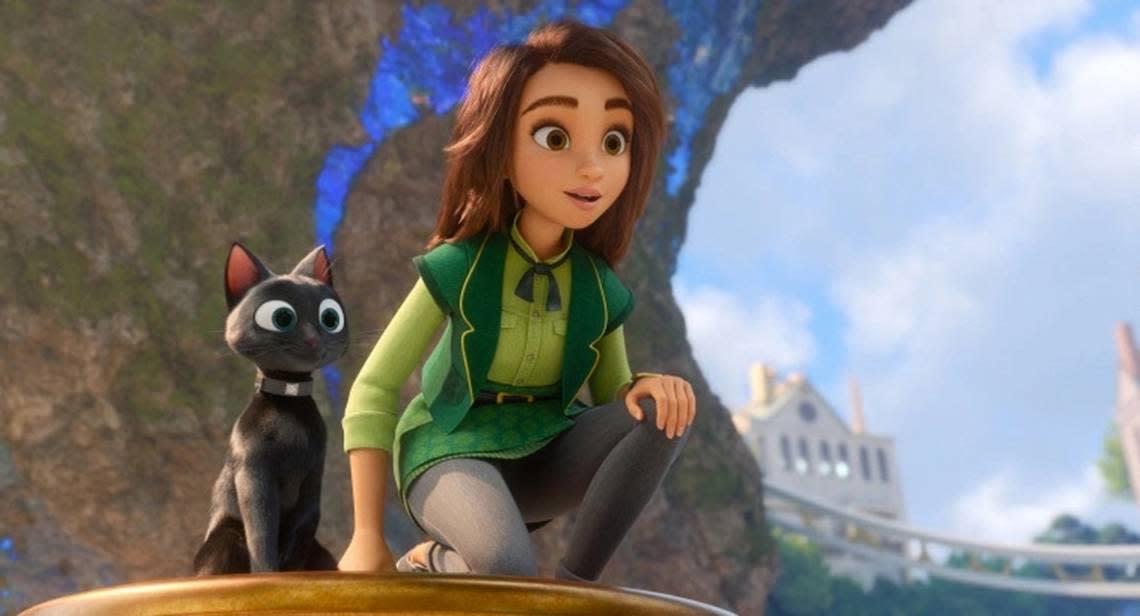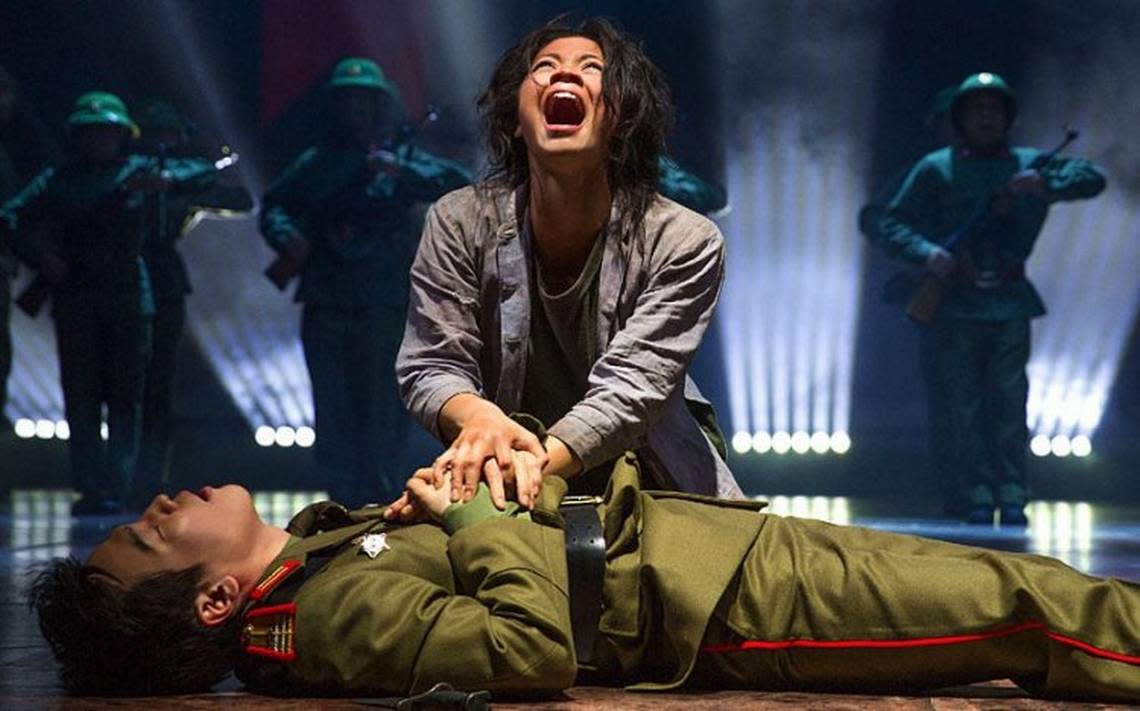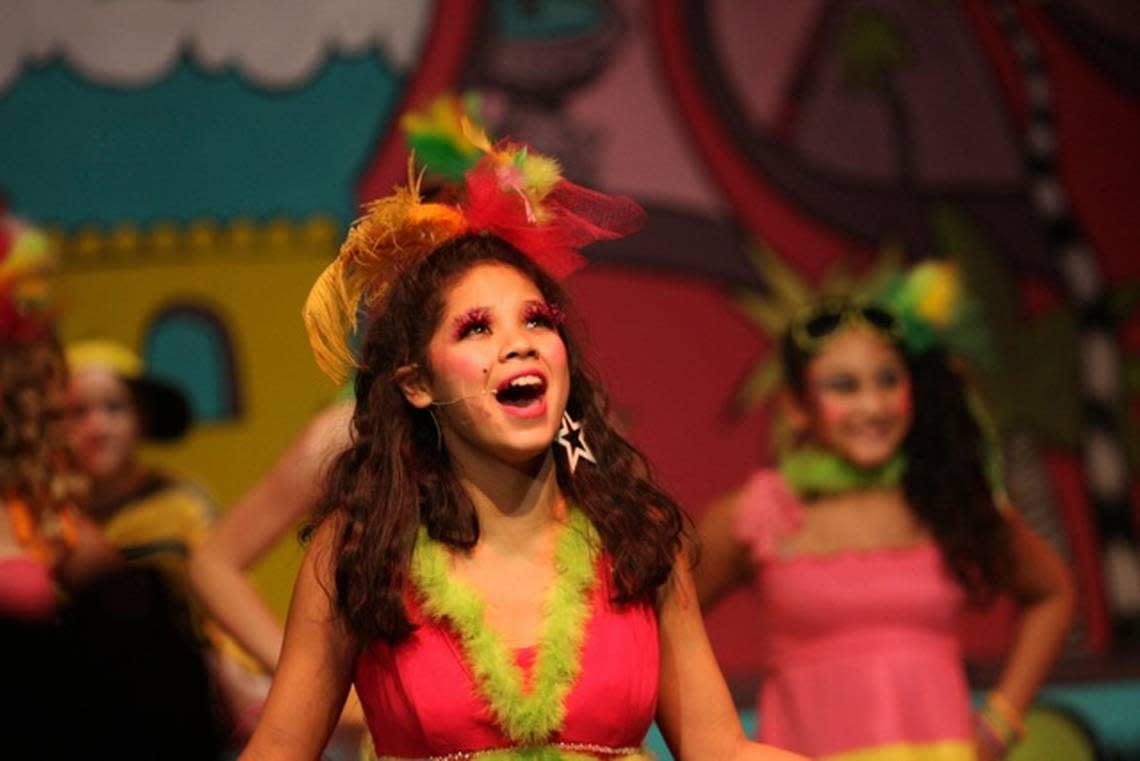This Charlotte native has 2 Tony nominations — and now, 2 new movies out on the same day
Two-thirds of the way through “Easter Sunday,” a holiday comedy about a Filipino-American family that opened in theaters Friday, someone announces to Eva Noblezada’s character that it’s Karaoke Night — and if you know anything about the Huntersville native, it’d be easy to think you know what’s to come from her.
After all, over the past six years, Noblezada has sung her way to two Tony nominations for Best Actress in a Musical on Broadway, first as the lead in the 2017 revival of “Miss Saigon” and then in 2019 as Eurydice in “Hadestown.”
So of course there’s going to be a big moment for her with a microphone during a climactic scene. Right?
Well, there is a karaoke performance, featuring eight different actors. But Noblezada isn’t in it.
“I quite like that,” says the 26-year-old, who co-stars as Tala, a straight-talking high-schooler befriended by Joe Jr. (Brandon Wardell), son of the main character played by the comedian Jo Koy. “I mean, it’s good to have actors just be able to spread their wings and not just be stuck, known for one thing. I love the fact that I didn’t sing in ‘Easter Sunday,’ because that’s not why I was hired, and it challenged me more to work on my acting skills ... more than doing something that I was comfortable doing.”
Noblezada — herself half-Filipina and half-Mexican — talked to The Charlotte Observer by phone on Thursday from her home in New York City while eating breakfast. At 4 p.m. Because her current “normal” work schedule sees her routinely not waking up until 2 in the afternoon. Because she’s still starring in eight performances of “Hadestown” a week.
And this week was also a week in which not one but two movies that showcase Noblezada are debuting on the same day.
In addition to “Easter Sunday,” she’s the voice of the unlucky girl at the center of the computer-animated comedy “Luck,” which debuts on Apple+ on Friday. She was able to work on both during the pandemic because of the Broadway shutdown.

On the Thursday call, Noblezada — who famously left Northwest School of the Arts before graduating, at 17, to star in “Miss Saigon” in London, and whose parents and siblings still live in the Charlotte area — explained why “Easter Sunday” is so groundbreaking (and so personal); how she navigates her obviously-very-busy career path; what not-so-fine dining experience she misses most about the Queen City; and much more.
The conversation has been edited for clarity and brevity.
Q. So I watched “Easter Sunday” earlier today. You’ve seen it, I assume?
Yes, I actually saw it at the Chinese Theatre (in Hollywood) for the first time two nights ago and it was insane. I lost my marbles.
Q. The movie was shot in the spring of 2021, and the release date was originally going to be this past spring, but it got pushed back. And then “Luck,” also, was made during the pandemic and originally supposed to be in theaters in March of 2021 but got delayed. What’s it like to finally see them both come out?
Oh my God. You know when you order items from a store that’s in Australia or something, and you order it and you’re really excited, but you know that it’s not gonna get to you for like two weeks — and then once it arrives you’re like, “Holy crap! I almost forgot that I got this!” And you open it, and it’s like Christmas? Kind of the same feeling as this — except 50 times more exciting.

Q. How did “Easter Sunday” come to you, and what made you want to do it?
Well, just like any other actor, I got an audition sent to me from my agents. And I loved the idea of being a part of this cast. I mean, who wouldn’t want to be a part of kind of history — you know, cinematic history? My audition was essentially a scene read with Jay (director Jay Chandrasekhar) and a few of the other people higher up on the totem pole over Zoom, and they made the room — the technical, computer “room” — feel super-warm and friendly. It felt like family already, because I knew what the movie was gonna be about. I was super-stoked. And also, most importantly, super-grateful to have gotten a job amidst the pandemic.
Q. Can you talk about that “cinematic history” a little bit more?
I was part of a independent movie called “Yellow Rose” a few years ago and that was the first movie written, produced and directed by a Filipino (Diane Paragas), and starring a Filipino, ever released by a major film studio, Sony. And “Easter Sunday” is the Big Kahuna for Filipino movies. To show up on set and see everyone that’s Filipino, and having similar stories to you and different stories to you, you just kind of melt into this kaleidoscope of your culture.
It was so special to hear the reaction of the audience at the Chinese Theatre the other day, of just Filipinos laughing — crying-laughing — about how they’re literally being seen on a big screen. And not just seen, not just somebody who looks like them, but you’re telling a story that’s so deeply connected to who you are, and it’s gonna be released for everyone to see, and for everyone to laugh at, and for everyone to find a connection to it.
You could have heard a pin drop in some of the moments. There’s a scene where Jo’s character is speaking to his mom (Lydia Gaston) about how she pushed him so hard, but that’s what made him who he is. And Lydia does this incredible monologue as a mother about how they immigrated to the States, and their dad wasn’t there, and she had to raise their family being a single mother who was still learning English and wanted her children to catch up to the rest of the kids who were American. A lot of people in the audience — I mean, Filipino or not — probably could really connect with that.
So it’s huge. I mean, it’s 2022, man. Like, we gotta step up with representing and telling stories of people.
Q. Did you recognize some of your own family in the movie? (Noblezada’s father has Filipino ancestry.)
Oh, not just recognize. It’s not like I go, “Ohhhh, that’s cool. That’s like me.” No, that is me. That’s not like me. That literally is my family. I walked into the set of the “Easter Sunday” house, and I was like, “This is literally my lola’s (grandma’s) house. It’s a set! How does it smell like my lola’s house?” And it was the prop people. They had made all this incredible food, and it just smelled like home. All of us were like, “How is this possible??”
But yeah, I can’t wait for my dad to see it, because he’s gonna be like, “Oh my God. That’s so funny! We know these people. These are people in our family.” (Laughing.) I wish I could be there with my family when they see it, but I know that they’re gonna howl.
Q. You mentioned “Yellow Rose,” your first film. So now — not including “Luck,” which is animated — this is a couple of films in a row that you’ve done that provide audiences with this window into the Filipino-American experience. In terms of creating a body of film work, were the choices intentional, or more coincidental?
I think with my little experience in the industry, it’s impossible to be intentional with what you want to do, because I’m not writing the script and putting the team together. That’s the universe having Diane and Annie (“Yellow Rose” co-writer Annie Howell) come together and write “Yellow Rose,” and then they come see “Miss Saigon,” and they go, “That’s who I want to play Rose.”

The intentional part for me is when projects come to me and I get the chance to audition for projects that I really want, if I get cast in them, all I can bring is the intention of doing a good job. The intention of being true to myself, but also making sure that the character, I can look back on it in 10 years and go, “Yes, Eva, we did a great job.” The intention of how I carry myself while I do these projects: “Am I gonna challenge myself to grow and be a great person and be kind to myself throughout the journey of being a young woman of color in the industry? Abso-f---ing-lutely, I will.”
But I definitely wouldn’t say that any part of my career is calculated. There are definitely things that I don’t want to do. I have no desire to be famous. I just have a desire to do projects that I genuinely love — that I can give everything to. ’Cause that’s very me. I’m very all or nothing.
Q. What are the differences between the fulfillment you get from being on stage and the fulfillment you get from being in movies?
Being on stage and being in movies is totally different. But both of them involve all of you. I feel like making movies is higher pressure for a shorter amount of time.
With theater, your whole day, you’ve gotta relax, make sure that you’re ready for the show. You’ve gotta do your normal people chores: clean the house, walk the dog, go to the gym. But then once you get to work — the second I walk through the stage door, I’m on. My body is ready to do the work. And I don’t ever want to give less than 200%. So, it’s high stakes for a short amount of time. Three hours, tops. Then I get to go home and have a drink. But the thing is I do that every day.
With movies, from my little experience of doing it, you know, it’s — you wait around, then for 10 minutes, you’re on, on, on, on, on. It’s definitely challenging in a different way. But after you’re wrapped, you wash your hands and it’s on to the next. Or take a break if you want. So it’s different. But any project you do, you should give all of yourself to it. In a healthy way.
Q. The other thing that strikes me as interesting about the difference between the two — and I’ve heard you talk about this before — is that when you do a show that’s long-running, the way you think about the character can change over time. Whereas when you do a movie, you do your performance, and it’s locked. It’s done. And it never changes.
Yeah, you’re totally right. I mean, for example, I’m lucky enough to work with this wonderful man named Reeve Carney (her “Hadestown” co-star and boyfriend of three years), and we talk about this all the time, about how his Orpheus and my Eurydice, they gradually change. And it’s exciting, because you get to live with this character, and we get to watch this character grow. And obviously the characters change a little bit when new people come into the show, or when people leave — you get different energies, and it’s exciting.

That’s the magic and the spark of live theater, is that you know how it’s gonna end and how things should go, but it might not go the same way it did the night before. If anything, it won’t. Things happen. Maybe I’m feeling super-emotional today, and I’m like, “OK, I might as well use this in a way that’s healthy. Let me get it out in the show.” I know that not everyone’s like that. But I for sure am. My Eurydice has definitely changed — in a way that still is true to the show, of course. But in my brain and in my body, she’s really changed, and grown.
Q. When you were growing up, were there movies where you felt like, “Oh, this is a movie for me. My culture is reflected in what I’m seeing on screen?” Seminal movies for you, either on the Filipino side or on the Mexican side?
The only Filipino I know that was in a movie was Lea Salonga. She was the voice of Jasmine (in Disney’s “Aladdin”), she was the singing voice of Mulan. And I loved Mulan. Out of all the Disney princesses I related to her the most. She was a hero, and I aspired to be like that, too.
Funny enough, the only other movie that I was like, “Ohhh, they’re Mexican, too!” — was “Three Amigos” (the 1986 comedy starring Steve Martin, Chevy Chase and Martin Short), which is not something that I will be showing my kids. (Laughing.) If it came out today, it would probably get roasted. It’s so jacked up. But it was just funny. And it does hold a place in my heart because my tata (father) loved that movie so much.
Also, when I watched “Coco” for the first time when it came out in 2017, I bawled. I was sitting actually with some of the cast members of “Miss Saigon” — Julian DeGuzman and Lianah (Sta. Ana), and I think Viveca (Chow) was there, too — and we watched “Coco.” And the first line is Miguel saying, “Sometimes I think I’m cursed,” in his accent. And I just bawled. I was like, “Oh my God. This is legit!” I’ve never been to Mexico City to experience Día de los Muertos, but I know that lingo. I know how it feels when your abuela looks at you and says, “Mija!” And to hear that, and see that in a movie, I was like, “What?? This is crazy!!”
I still watch Coco all the time if I want to feel like my family’s with me. And if I want to ruin my heart and tear my heart out.
Q. Did you imagine — if you think back to being a sixth-grader at Northwest, when you had one line in “Cinderella” — that this would be your life at 26?
Yeah, I knew. I knew, because I always knew young — young, young, young, when I was 2 or 3 — that storytelling was so important. And I grew up having a family that was so supportive of that, and life imitates art. So there’s nothing that I’m gonna experience in my life that’s not gonna be for the better. I hate to say it. There are things that hurt, that I’m still hurt by, and I wouldn’t be who I am without those things. But people write stories and they write plays and they dance and they sing because of the pain and also the beauty of just life. So there was nothing that was stopping me from creating that life for myself.
I think that’s what I’m trying to say is: I wasn’t waiting for someone to give me a job. I was creating it for myself — in any way possible. I mean, sitting in my closet on Cottsbrooke Drive in Huntersville, North Carolina, doing monologues in my crappy laptop webcam; I was like, “I’m creating this myself,” and that fulfilled me.
I didn’t need to look a certain way back then. I didn’t feel the pressure to get a job or be a childhood Disney star. I just felt the desire and the inspiration to create that life for myself.

Q. Do you ever get nostalgic for Charlotte?
I don’t miss the city. But there are beautiful things that I hold dear to my heart because of Charlotte. I created such a weird routine for myself living there, of just going to the field and taking pictures and being so artsy-fartsy. My family, of course, I miss. And you know what? I miss Cook Out. (Laughing.) I do miss Cook Out.
Q. What was your order?
It was a thing where you just frickin’ piled it on. You got a frickin’ burger, and then you could do fries and a milkshake. Back when my stomach could tolerate dairy. You’d get whatever the hell you want. Onion rings, chicken nuggets — damn, for what? Seven dollars? Are you joking? Here in New York City, you go to the bodega and get a Gatorade and they’re like, “$13.99.”
Q. Going back to “Easter Sunday,” you talked about what you think the movie will mean to Filipino-Americans. Can you talk a little more about how you think people who are not Filipino might experience the movie?
I think if you were to close your eyes, and not have been told that the family was Filipino — it’s just a family. And everyone has that. Or, I hope they do. If you take away the bias and you take away the stereotypes, you see yourself, and you see your neighbor. What better way to reset your brain from all of the racial inequity in the world by looking at this and saying, “They’re just people.” It’s not like there’s a superhero that comes in and saves the world from ending. It’s just a great script and great people that go through this great story, and it just so happens that they’re a family. You see the dynamics of that, and you see the comedy in that, and you see the heart in that, and you see the humanity in that.
When I watched the movie, I felt less alone. I didn’t even know that I was feeling alone, but I felt less alone.
Q. And now that you’re a double-threat — established Broadway star, budding Hollywood actress — I mean, where do you see yourself in five years?
Aw, man. My answer whenever someone asks me that is so boring. I’ve spent too long of my life really basing my fulfillment off of my job. Which is not fair. Life is too short. And also I don’t want to make the moments too short — because life is too short, I might as well make every moment feel like a hundred years. I couldn’t do that when I gave everything to my job. My job isn’t a living human being. I am. And I carry myself through my job, my relationships, my friendships, my life.
So I have to flip the perspective to Eva comes first. Which means that if I am standing on solid ground that I’ve provided for myself — and a very important sense of awareness and accountability for who I am, and what I do, and what I say — then the projects that I say yes to of course will be fulfilling, because I’m ready and I’m prepared, as a human being. But yeah, it’s definitely tricky sometimes. It’s easy to lose yourself, you get exhausted, and you’re in demand; people want to see different sides of you, and you have to stay true to yourself.
Q. So you’ll go in the direction that the spirit moves you, basically.
Yeah, absolutely. That’s exactly how I feel. I mean, I have goals. But I like the idea of law of attraction. For example, take my character in “Luck.” If you wake up and you say, I’m gonna have a s----- day, you’re probably gonna have a s----- day. But you can also wake up and set the intention of “OK, things might go wrong today, and they might not. But let’s stay forward, let’s stay neutral, and let’s stay in our body, and in the moment. And make sure we make the best decision for ourselves.”
But yeah, totally how the spirit moves me. I also can’t control what projects come in and the timing of things, and if I audition for something and I get told no, I have to learn not to take those things personally — because it’s not that I’m not good enough, it’s that the universe is like, “Hold on. We have something better for you. You just don’t know it ’cause you’re not a psychic.”
